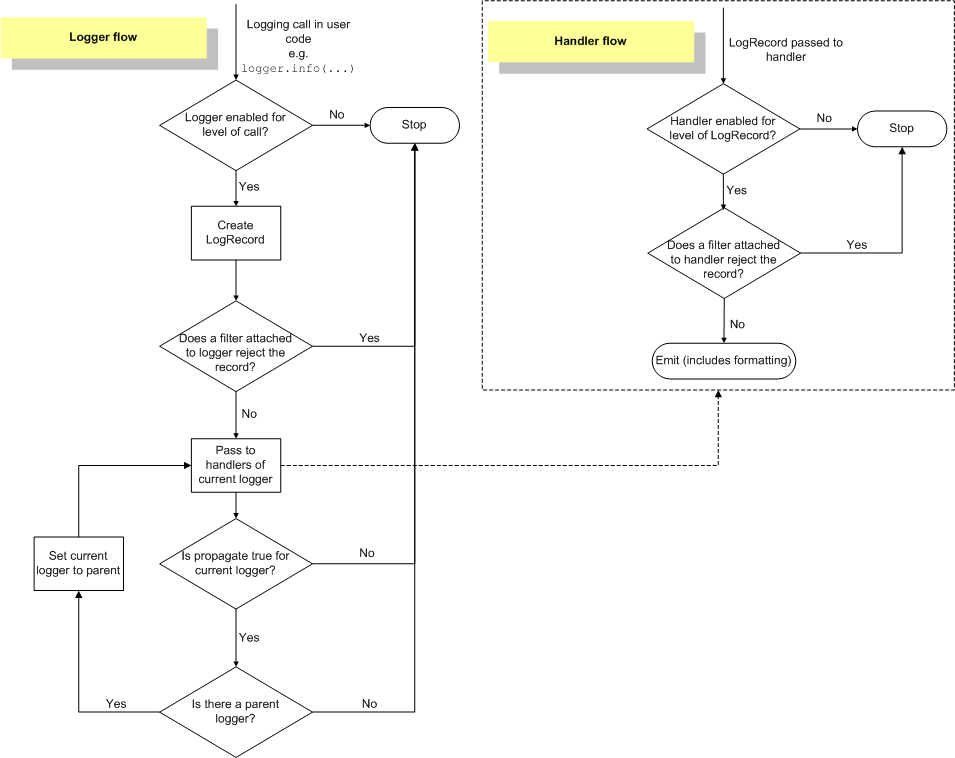Python logging
10 Oct 2017Pythong logging module

- Loggers expose the interface that application code directly uses.
- Handlers send the log records (created by loggers) to the appropriate destination.
- Filters provide a finer grained facility for determining which log records to output.
- Formatters specify the layout of log records in the final output.
- ` LogRecord`
syslog
Rsyslog
Python Logging
import logging
logger = logging.getLogger(__name__)
logger.setLevel(logging.INFO)
# create a file handler
handler = logging.FileHandler('hello.log')
handler.setLevel(logging.INFO)
# create a logging format
formatter = logging.Formatter('%(asctime)s - %(name)s - %(levelname)s - %(message)s')
handler.setFormatter(formatter)
# add the handlers to the logger
logger.addHandler(handler)
logger.info('Hello baby')
Logger
logger names track the package/module hierarchy, and it’s intuitively obvious where events are logged just from the logger name.
Logger.setLevel()specifies the lowest-severity log message a logger will handle, where debug is the lowest built-in severity level and critical is the highest built-in severity. For example, if the severity level is INFO, the logger will handle only INFO, WARNING, ERROR, and CRITICAL messages and will ignore DEBUG messages.Logger.addHandler()andLogger.removeHandler()add and remove handler objects from the logger object. Handlers are covered in more detail in Handlers.Logger.addFilter()andLogger.removeFilter()add and remove filter objects from the logger object. Filters are covered in more detail in Filter Objects.
Config
logging.ini
three ways:
-
Creating loggers, handlers, and formatters explicitly using Python code that calls the configuration methods listed above.
- Creating a logging config file and reading it using the fileConfig() function.
logging.config.fileConfig('logging.conf') - Creating a dictionary of configuration information and passing it to the dictConfig() function.
Use rotating file handler
Level/ Severity
debug(), info(), warning(), error() and critical().
Handler
class Handler()class logging.StreamHandler(stream=None)class logging.NullHandlerclass logging.FileHandler(filename, mode='a', encoding=None, delay=False)class logging.handlers.WatchedFileHandler(filename[, mode[, encoding[, delay]]])class logging.handlers.RotatingFileHandler(filename, mode='a', maxBytes=0, backupCount=0, encoding=None, delay=0)doRollover()
class logging.handlers.TimedRotatingFileHandler(filename, when='h', interval=1, backupCount=0, encoding=None, delay=False, utc=False)class logging.handlers.SocketHandler(host, port)class logging.handlers.DatagramHandler(host, port)class logging.handlers.SysLogHandler(address=('localhost', SYSLOG_UDP_PORT), facility=LOG_USER, socktype=socket.SOCK_DGRAM)class logging.handlers.NTEventLogHandler(appname, dllname=None, logtype='Application')class logging.handlers.SMTPHandler(mailhost, fromaddr, toaddrs, subject, credentials=None, secure=None)class logging.handlers.BufferingHandler(capacity)class logging.handlers.MemoryHandler(capacity, flushLevel=ERROR, target=None)class logging.handlers.HTTPHandler(host, url, method='GET')
misc
- Logging variable data:
logging.warning('%s before you %s', 'Look', 'leap!') str.format() string.Template from string import Template s = Template('$who likes $what') s.substitute(who='tim', what='kung pao')
TODO
- what is python module and
__name__variable? if the python interpreter is running that module (the source file) as the main program, it sets the special__name__variable to have a value “__main__”. If this file is being imported from another module,__name__will be set to the module’s name. A module’s__name__is set equal to ‘__main__’ when read from standard input, a script, or from an interactive prompt. A module can discover whether or not it is running in the main scope by checking its own__name__, which allows a common idiom for conditionally executing code in a module when it is run as a script or with python -m but not when it is imported:
For a package, the same effect can be achieved by including a __main__.py module, the contents of which will be executed when the module is run with -m.